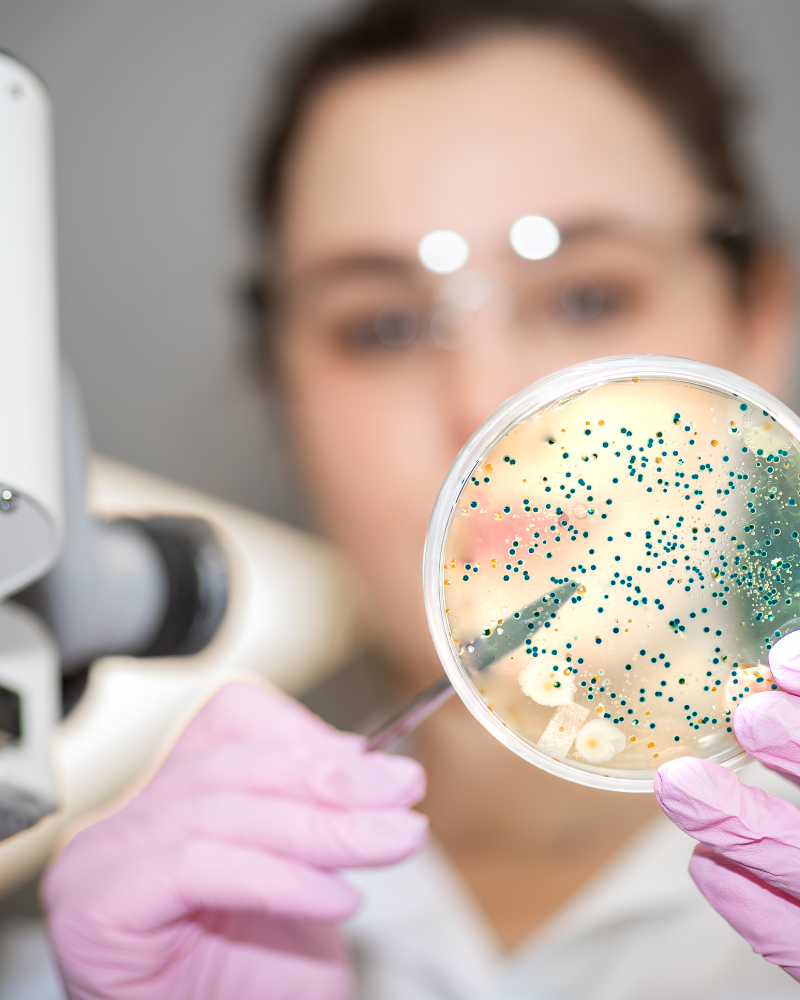Biotechnology

If you’re compassionate, detail-oriented, and driven by a desire to improve lives, a career in the health professions could be your true calling. This field is ideal for individuals who thrive on helping others and are committed to continuous learning in a dynamic environment. You should possess strong communication skills, an empathetic nature, and the ability to remain calm and focused under pressure. Whether you’re drawn to direct patient care, groundbreaking research, or managing vital healthcare systems, the health professions offer a profoundly rewarding path for those eager to make a tangible difference in the well-being of individuals and communities.
The Basics
Biotechnology harnesses biological processes, organisms, or systems to develop new technologies and products that improve our lives and the world around us. This expansive field integrates principles from biology, chemistry, engineering, and computer science to address challenges in healthcare, agriculture, industry, and environmental protection. It’s about taking scientific discoveries from the lab and translating them into practical applications.
Types of Biotechnology and What They Do (briefly):
- Medical/Red Biotechnology: Focuses on developing new drugs, therapies (like gene therapy), diagnostic tests, and vaccines for human health. Professionals in this area might work in pharmaceutical companies, hospitals, or research institutions.
- Agricultural/Green Biotechnology: Aims to improve crop yields, disease resistance, and nutritional content in plants. This includes developing genetically modified crops, biofuels, and biopesticides.
- Industrial/White Biotechnology: Involves using biological processes to create new materials, chemicals, and energy sources more efficiently and sustainably. Examples include developing biodegradable plastics, bio-based fuels, and industrial enzymes.
- Environmental/Blue Biotechnology: Applies biotechnological methods to address environmental issues, such as bioremediation (using microorganisms to clean up pollutants), waste treatment, and sustainable resource management, particularly in marine and aquatic environments.
- Bioinformatics: Combines biology with computer science and statistics to analyze complex biological data, such as genomic sequences. This is crucial for drug discovery, personalized medicine, and understanding biological systems.
Why Biotechnology?
The biotechnology industry is a rapidly growing sector that offers stable, high-demand careers with immense opportunities for innovation and professional growth. You’ll have the chance to contribute to groundbreaking advancements, often seeing the direct impact of your work in developing life-saving medicines, more sustainable food sources, or novel industrial processes. This field is at the forefront of scientific discovery, ensuring an intellectually stimulating and deeply rewarding professional journey.
Preparation
Pursuing a career in biotechnology typically involves rigorous academic preparation in STEM fields. This often includes foundational coursework in biology, chemistry, mathematics, and physics, followed by specialized undergraduate and graduate programs in biotechnology, bioengineering, molecular biology, genetics, or related disciplines. Gaining hands-on lab experience through research opportunities, internships, or co-op programs is critical for developing practical skills and understanding industry demands.
Developing a strong foundation of skills is essential for success in biotechnology. This includes:
- Strong scientific and analytical skills: For experimental design, data interpretation, and problem-solving.
- Lab Skills: Proficiency in molecular biology techniques (e.g., PCR, gel electrophoresis, cell culture), biochemistry, and microscopy.
- Problem-solving and critical thinking: For designing experiments, troubleshooting issues, and interpreting complex results.
- Attention to detail: Crucial for experimental accuracy, data integrity, and safety protocols.
- Excellent communication and teamwork skills: For collaborating with multidisciplinary teams, presenting findings, and writing technical reports.
- Computational skills: Proficiency with bioinformatics tools, statistical software, and programming languages (e.g., Python, R) is increasingly important.
- Adaptability and persistence: To navigate the iterative nature of research and development, often facing challenges and setbacks.
Career Readiness
- Coaching Appointments: Schedule an appointment with a career coach at the OPCD for personalized guidance on:
- Resumes & cover letters
- Major or career exploration
- Internship and job search strategies,
- Networking techniques,
- Interview preparation,
- Job offer evaluation and negotiation
- Navigating graduate or professional school applications
- Quick Questions:
- For quick questions, drop in Mon-Thu from 1:30 to 4:30.
- Wake Your Resume: Attend our Wake Your Resume workshops on Wednesdays in the OPCD during the academic year. Search for a session and register on Handshake.
Events & Opportunities
- Handshake Profile: Update your Handshake profile and career interests to see relevant opportunities.
- LinkedIn: Utilize LinkedIn to connect with Wake Forest University alumni. Learn more about networking.
Wake Forest University Programs:
Other Resources
Professional organizations specific to various biotechnology fields:
- Biotechnology Innovation Organization (BIO): The world’s largest trade association representing biotechnology companies.
- American Society for Microbiology (ASM): For professionals focused on microbiology, a foundational area for much of biotechnology.
- Biomedical Engineering Society (BMES): For those at the intersection of engineering and biology, developing medical technologies.
- American Association of Pharmaceutical Scientists (AAPS): Relevant for careers in pharmaceutical biotechnology and drug development.
- Society for Industrial Microbiology and Biotechnology (SIMB): Focuses on the application of microbiology and biotechnology in industrial settings.
- International Society for Stem Cell Research (ISSCR): For cutting-edge research and applications in stem cell technology.
- American Society of Human Genetics (ASHG): Important for careers in genetic engineering and genomic applications.
